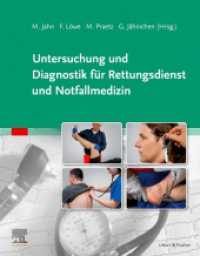- ホーム
- > 洋書
- > 英文書
- > Literary Criticism
Full Description
William Muggins, an impoverished but highly literate weaver-poet, lived and wrote in London at the turn of the seventeenth century, when few of his contemporaries could even read. A Weaver-Poet and the Plague's microhistorical approach uses Muggins's life and writing, in which he articulates a radical vision of a commonwealth founded on labor and mutual aid, as a gateway into a broader narrative about London's "middling sort" during the plague of 1603.
In debt, in prison, and at odds with his livery company, Muggins was forced to move his family from the central London neighborhood called the Poultry to the far poorer and more densely populated parish of St. Olave's in Southwark. It was here, confined to his home as that parish was devastated by the plague, that Muggins wrote his minor epic, London's Mourning Garment, in 1603. The poem laments the loss of life and the suffering brought on by the plague but also reflects on the social and economic woes of the city, from the pains of motherhood and childrearing to anxieties about poverty, insurmountable debt, and a system that had failed London's most vulnerable. Part literary criticism, part microhistory, this book reconstructs Muggins's household, his reading, his professional and social networks, and his proximity to a culture of radical religion in Southwark.
Featuring an appendix with a complete version of London's Mourning Garment, this volume presents a street-level view of seventeenth-century London that gives agency and voice to a class that is often portrayed as passive and voiceless.








